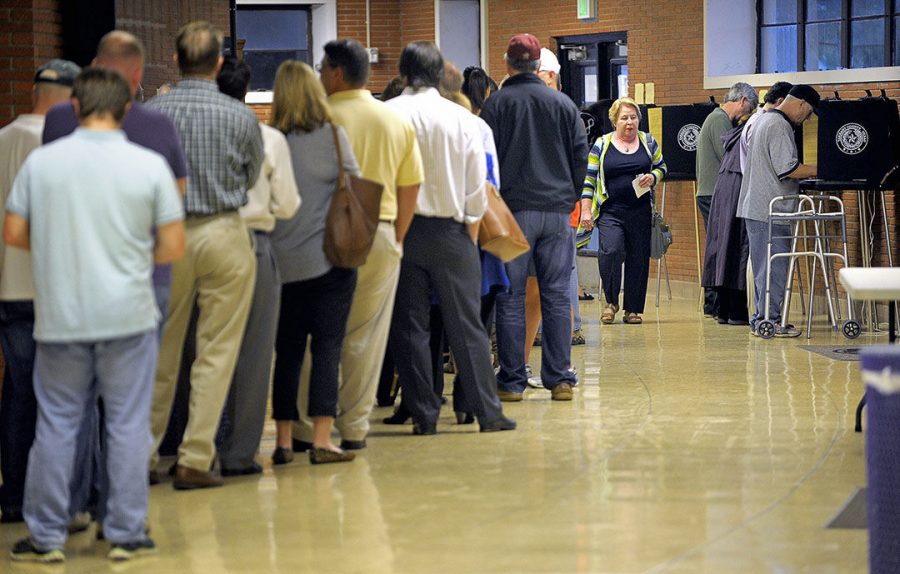OURVIEW: Youth votes more important than ever this election
Voters line up at the polling site at Paschal High School in Fort Worth, Texas, on Tuesday, Nov. 4, 2014.
Every week the editorial board reflects on a current issue in Our View. The position taken does not reflect the opinions of everyone on the Hilltop Views staff. This week’s editorial board is composed of Viewpoints Editors Victoria Cavazos and Sully Lockett and Copy Chief Gabrielle Wilkosz.
We didn’t think we had to rehash this in our Viewpoints section, but we all need a reminder.
Election season is on. And it’s more important than ever for people to vote.
Every vote this election will count for either Clinton, Trump or some obscure (and possibly incompetent) third-party candidate. That person will determine the fate of our nation.
There is a lot to lose in this election, namely, the remnants of human decency and the virtue of the democratic process. But there’s also much to gain as long as you’re into competent female leads.
Still convinced this doesn’t apply to you?
The statistical probability of young people going to the polls this year is a little grim.
What “the youth” want and voter turnout in this country haven’t always correlated well.
According to an analysis of U.S. census data from the Pew Research Center, millennials continue to have the lowest voter turnout of any age group.
Although this year’s relentless avalanche of impassioned tweets about the candidates would seem to indicate otherwise, the presidential elections traditionally haven’t been well attended by young people.
The center reported that only 46 percent of millennials voted in the last generation compared to 72 percent of the “Silent generation,” citizens born between around 1925 and 1940.
The article also noted that this election “marks the first time essentially all millennials in this country are old enough to vote.”
Yet there’s hope. With such strong numbers this year, millennials need to get serious about the issues and mobilize or else a large portion of the electorate will go unrepresented.
Although predicting voter turnout isn’t easy or precise, the numbers are a useful gauge for guiding more concentrated outreach efforts. Already there have been numerous public service announcements produced this season targeting young voters.
Still, many are disillusioned with the voting process as a whole and are hesitant to vote for either of the major candidates. Among those young people is sophomore Will Wodenshek.
“I don’t believe in the election this year,” Wodenshek said. “Neither candidates are good representations of this country.”
Wodenshek said that he probably wouldn’t be voting in this election.
Like Wodenshek, many students feel this way about the elections this year; and in a way, they’re not to blame.
So much misinformation, propaganda, and outright falsehoods have circulated about the candidates this election season that it seems confusing to choose the “right” candidate.
But despite the seemingly chaotic nature of this election, it is important that millennials take the time to familiarize themselves with the facts.
Even though Hillary and Trump may look more like reality tv contestants than presidential candidates, at the end of the day, we still have a responsibility to make an important choice, to do something rather than accept it lying down.
Maybe neither of them will be right, but one of them will definitely be wrong.
In the end we will still be left with one of the candidates.
We at Hilltop Views believe that it’s not enough to just cross our fingers and hope that it won’t be Trump.
If voting for either of the major candidates will conflict with your sense of morality or compromise your values, think about how not voting will compromise you.
A failure to vote is just as much a decision as casting one. By failing to vote, you remove yourself from any right to complain over the next four years because you didn’t have the courage to make any choice at all.
Even though it might seem conflicting or wrong to vote for a candidate who you wouldn’t necessarily trust, we’re inevitably going to end up with one or the other, so weighing in might not be the worst thing you decide to do.







